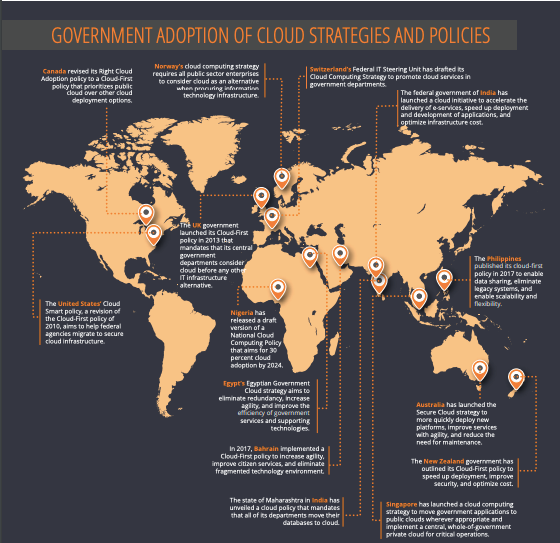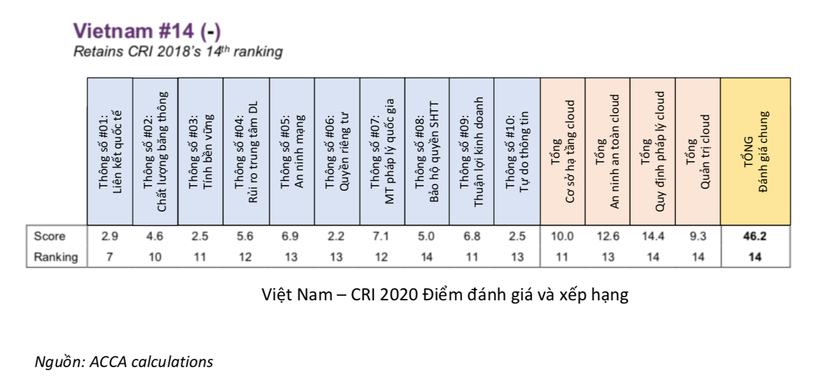
Emerging technologies such as AI, metaverse, machine learning, etc., fundamentally require three major platforms: data, analytics, algorithms, and cloud computing.
Benefits of Cloud Computing
Cloud computing has become one of the core, crucial technologies in the digital transformation process, from enterprise level to national scale. Many emerging technologies like AI, metaverse, machine learning, etc., fundamentally operate on three key platforms: data, analytics, algorithms, and cloud computing. Among them, cloud computing plays a critical role in providing computational capacity to process and analyze data, thus enabling innovative solutions.
Compared to traditional physical infrastructure, cloud computing offers numerous benefits to businesses and the private sector. These include long-term cost savings on infrastructure investment, flexible operational costs based on usage, increased productivity, enhanced data security, and the ability to develop new products leveraging available technological resources.
From the public sector’s perspective, cloud computing is also viewed as an essential technological infrastructure to address the needs of governance, connection, and data sharing within state agencies, progressing toward open data for public access. Many countries, including Australia, the United Kingdom, and the Philippines, have implemented cloud-first policies in recent years as a way to encourage the adoption of this technology in the operations and activities of government agencies.

Figure 1. List of countries with cloud computing strategies and policies.
Source: Deloitte's "Government Trends 2020" report.
A Market with Untapped Potential
Looking at the Vietnamese market, although the potential for cloud computing is enormous, its growth rate has not matched expectations. Two factors contributing to this situation include user motivation and cloud adoption levels in Vietnam.
For SMEs, transitioning their entire systems to the cloud is relatively straightforward due to their smaller scale and less complex operations. Some startups even begin with cloud-native systems. In contrast, for larger enterprises or public sector organizations, transitioning to the cloud faces greater challenges due to existing long-term infrastructure investments, limited technological skills, and processes that are not yet adapted for cloud migration.
According to the Asia Cloud Computing Association’s assessment of cloud readiness, Vietnam scored only 46.2 out of 100 points in 2020. While infrastructure-related indicators for operating cloud systems have improved over the years, other indicators, especially those related to legal regulations (such as privacy, national legal environment, and intellectual property protection), scored the lowest compared to other evaluated countries.

Figure 2. Vietnam’s cloud readiness scores.
These scores reflect the current situation and policy bottlenecks in Vietnam. When discussing cloud computing, one often envisions decentralized operations and storage not fixed in a specific geographical location, allowing data to flow and be stored globally. However, Vietnam still lacks unified regulations on personal data protection, cross-border data flow, or appropriate technical standards for cloud computing.
The 80-20 Story of Vietnam's Cloud Market
According to the Ministry of Information and Communications, domestic cloud service providers currently account for only 20% of the market share, compared to 80% dominated by foreign players like Microsoft, AWS, and Google. This raises concerns about the competitiveness of Vietnamese companies against foreign enterprises with extensive experience and superior resources.
However, from another perspective, instead of relying on protective measures, local cloud providers can enhance their competitiveness by collaborating with international companies to refine their products, improve service quality, and create solutions tailored to local users.
Currently, multi-cloud computing is predicted to become a future trend, where customers combine cloud services from multiple providers to optimize costs and user experience. This is also the direction Vietnamese companies are pursuing in the next phase, connecting directly with the clouds of international businesses.
Thus, viewing the cloud computing market as an ecosystem, the roles of foreign and domestic enterprises are complementary, synergistic, and competitive for shared growth rather than adversarial or divisive. Foreign enterprises hold advantages in infrastructure and platforms with years of operational expertise, while local businesses excel at leveraging these platforms to develop applications and foster innovation. By collaborating and synergizing with international firms, domestic companies will have greater opportunities to expand globally, widen their markets, and enhance the quality of services for users both inside and outside Vietnam.
Tran Dang Quang - Institute for Policy Studies and Media Development



.jpg)

